

Chris dixon's blog / App store shenanigans. I’ve downloaded and tested a few hundred iPhone and iPad apps.
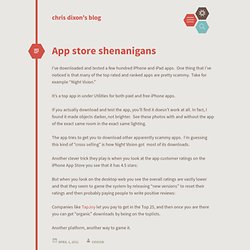
One thing that I’ve noticed is that many of the top rated and ranked apps are pretty scammy. Take for example “Night Vision.” It’s a top app in under Utilities for both paid and free iPhone apps. If you actually download and test the app, you’ll find it doesn’t work at all. In fact, I found it made objects darker, not brighter. The app tries to get you to download other apparently scammy apps. Another clever trick they play is when you look at the app customer ratings on the iPhone App Store you see that it has 4.5 stars: But when you look on the desktop web you see the overall ratings are vastly lower and that they seem to game the system by releasing “new versions” to reset their ratings and then probably paying people to write positive reviews: Companies like TapJoy let you pay to get in the Top 25, and then once you are there you can get “organic” downloads by being on the toplists. Another platform, another way to game it. Mobile Game Developers Grapple With Apple Crackdown on Incentivized Installs.
We’ve been trying to get a sense of how the biggest freemium game developers are grappling with major changes to Apple’s policies this week.
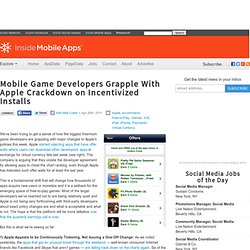
Apple started rejecting apps that have offer walls where users can download other developers’ apps in exchange for virtual currency late last week (see right). The company is arguing that they violate the developer agreement by allowing apps to cheat the chart ranking, even though Apple has tolerated such offer walls for at least the last year. This is a fundamental shift that will change how thousands of apps acquire new users or monetize and it is a setback for the emerging space of free-to-play games. Most of the larger developers we’ve reached out to are being relatively quiet and Apple is not being very forthcoming with third-party developers about exact policy changes are and what is acceptable and what is not.
Apple Appears to be Cracking Down on Incentivized Installs. Apple appears to be on a campaign to ban the practice of pay-per-install, where developers offer their apps in other games and pay for downloads when players install their titles for virtual currency.
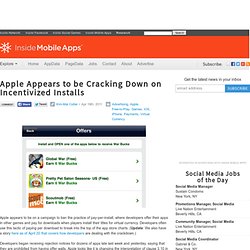
Developers often use this tactic of paying per download to break into the top of the app store charts. (Update: We also have a story here as of April 20 that covers how developers are dealing with the crackdown.) Developers began receiving rejection notices for dozens of apps late last week and yesterday, saying that they are prohibited from having offer walls. Apple looks like it is changing the interpretation of clause 3.10 in its developer agreement, which says, “Developers who attempt to manipulate or cheat the user reviews or chart ranking in the App Store with fake or paid reviews, or any other inappropriate methods will be removed from the iOS Developer Program.” It’s uncertain what will happen to the thousands of apps that have already been approved and have offer walls. Developers Still in the Dark About Apple’s Policies on Incentivized Installs, Rankings. Three weeks after Apple began rejecting apps containing offer walls, developers are still in the dark about what is acceptable and what is not under the platform’s new approach.
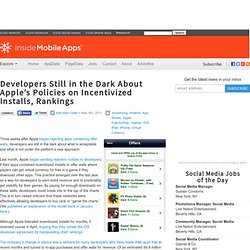
Last month, Apple began sending rejection notices to developers if their apps contained incentivized installs or offer walls where players can get virtual currency for free in a game if they download other apps. This practice emerged over the last year as a way for developers to earn extra revenue and to predictably get visibility for their games. By paying for enough downloads on these walls, developers could break into to the top of the charts. This is in turn raised criticism that these networks were effectively allowing developers to buy rank or “game the charts.”
(We published an explanation of the model back in January here.) Although Apple tolerated incentivized installs for months, it reversed course in April, arguing that they violate the iOS developer agreement by manipulating chart rankings. Tapjoy Voluntarily Dampens The Effect of Its Incentivized Install Campaigns to Appease Apple. Tapjoy is voluntarily dampening the effect of its incentivized install campaigns in the wake of a crackdown by Apple on the practice.
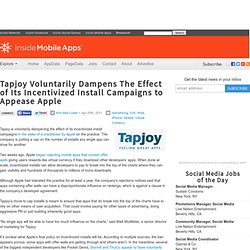
The company is putting a cap on the number of installs any single app can drive for another. Two weeks ago, Apple began rejecting mobile apps that contain offer walls giving users rewards like virtual currency if they download other developers’ apps. When done at scale, incentivized installs can allow developers to pay to break into the top of the charts where they can gain visibility and hundreds of thousands to millions of more downloads. Although Apple had tolerated the practice for at least a year, the company’s rejections notices said that apps containing offer walls can have a disproportionate influence on rankings, which is against a clause in the company’s developer agreement.